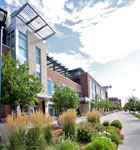
4840 Pearl East Circle, one of eleven buildings in a business park, recently received energy-saving lighting upgrades, thanks to W.W. Reynolds. Landscaping tops many tenants’ lists regarding their favorite aspect of the property.
In a progressive town such as Boulder, Colorado, it’s a fair bet that most commercial tenants want their workplaces to be as sustainable as possible. The process of reducing energy use, however, is prohibitive for individual lessees because few have the wherewithal to install energy-efficient lighting technology that qualifies for rebates. Which is why commercial landlord W.W. Reynolds Companies does the work for them.
W.W. Reynolds, founded in 1966, rents space on a triple-net lease basis, meaning Reynolds’ tenants bear their own utility costs. Even so, the firm spent $27,000 on new light fixtures—replacing 700 T12 fluorescent lights with T8s—in its building on Pearl East Circle. Why? “We knew which electrical upgrades would save money, and we had the expertise to apply for and receive the rebates,” says Jessica Bergen, a property manager for the company, which has a total of 3.75 million-square-feet of commercial space in about 80 buildings. “Not all tenants have these resources readily available.” Because the real estate firm was familiar with a rebate program from local utility Xcel Energy, it was able to recoup $17,000 of that investment in rebates.
In the real estate downturn of the past several years, W.W. Reynolds has focused primarily on upgrading existing properties in place of building new. One property it did build is a four-story, 92,800-square-foot mixed-use building that achieved Silver certification under LEED’s Core and Shell rating. The distinction was due in part to the application of a 44-kilowatt-hour SunPower photovoltaic solar collector that takes advantage of the area’s 300 days of sunshine per year and powers common-area lighting and systems. A separate solar-thermal system heats water for the entire building, 90 percent of which is used by the residential occupants.
To reinforce its environmental consciousness, W.W. Reynolds revisited its landscaping, building maintenance, and water management methods. Sustainable plantings are important in the relatively arid climate, and the company prioritizes natural fertilizers made of bat guano, fishmeal, kelp meal, and compost tea. “Maintenance staff use mostly hand tools—not such things as leaf blowers,” Bergen says.
Unlike the concrete jungles of major cities, Boulder prohibits water retention on private property, and building owners are urged to minimize water use wherever possible. “We [installed] almost 100 low-flow urinals, toilets, faucets, and showerheads at one property alone,” Bergen says. “This reduced water consumption by 75,000 gallons per year at that location.” Janitorial services keep the interiors clean and green at the same time. Staff are trained in the proper use and disposal of cleaning materials, including appropriate dilution systems, use of sustainable cleaning-care products (many of which meet LEED criteria), and low-impact pest-control practices.
The tangible results of these efforts point back to W.W. Reynolds’s eco-conscious culture, which begins right at the top: founder Bill Reynolds himself bikes about 8,000 miles per year. So as Boulder continues its constant evolution toward a greener future, W.W. Reynolds will be doing the same.


